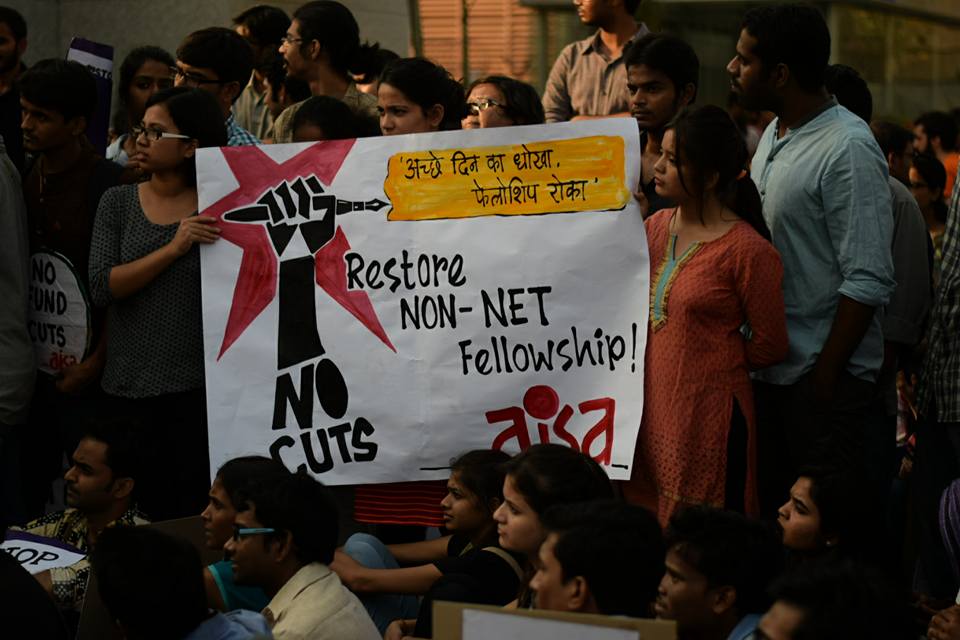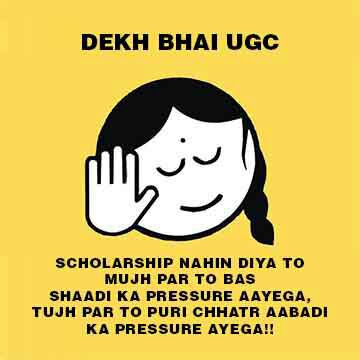The Occupy UGC movement looks irrelevant or ridiculous to the middle and upper classes in India because it can be made to appear so by the media. Not surprisingly, television channels and leading dailies either ignored the protests altogether, or worse, focused on the apparently far more *critical* issue of the “vandalism” and “disfigurement” of the ITO metro station by the protesting students. Times of India said they were “brazening it out” after their acts of vandalism, and on social media including Kafila, these student vandals have been additionally belittled by some as misguided pawns in the hands of an apparent conglomerate of ambitious lefty professors from JNU! Basically, anything but a legitimate set of demands, some of which this poster from the movement tries to explain…
(Incidentally, it was this image that was painted on the walls of the ITO metro station. Personally I found it cheerful).
Anyway, as Camalita Naicker reminded us in her excellent article on South Africa here on Kafila, student protests against rising student fees and shrinking scholarships and fellowships are no flash in the pan but a burgeoning worldwide phenomenon cutting across political affiliations. This is because you don’t need to be a leftist to understand that in contemporary conditions, pursuing a higher education is both the only guarantee to economic security, and the one thing that may be denied to you if you are from the wrong side of the tracks.
We post below statements from #OccupyUGC and #Occupy SOAS in support of each other. These have been sent to us by Akash Bhattacharya, research scholar in history at JNU.
FROM #OCCUPYUGC:
Dear friends, We might be standing miles apart but it seems we are fighting a similar cause. We have heard how the students, teachers and staff at School of Oriental and African Studies, University of London have been relentlessly raising their voices against the discreet proposal of cuts in funds at the institute, scraping of courses which are tagged as ‘less relevant’ for the market , subsequent job losses, undemocratic governance and the undue suspension of Sandy Nicoll, Unison branch secretary, in its wake. While it throws open questions about the specific situation at SOAS, it, at the same time, exposes how the sphere of public education is getting increasingly tied with the functioning of capital and the implicit linkage between the University and Industry. We not only extend our solidarity to such an exposure by the students and staff at SOAS, we also salute the grit with which the struggle has taken place in the face of constant monitoring by the authorities. Here, in India we also have been fighting the sell- out of research and education. Recently, University Grants Commission, the highest governing body of the Universities in the country, had announced the scrap of a fellowship which is granted to the researchers who are pursuing M.Phil and Ph.D (a mere Rs 5000 and Rs 8000 respectively per month, lower than the stipulated minimum wage of the country) in the Central Universities. With the demand of :1)Reinstatement of the fellowship; 2) Enhancement of fellowship and 3) Extension of fellowship to all State Universities, we are in the midst of a struggle where we have occupied the entrance street leading to the UGC Headquarters building in New Delhi and which is doing rounds by the name of #occupyUGC. The space is inhabited by students and teachers of different Universities in the capital city, with slogans, postermakings, open-classes with teachers and cultural performances. Not just this, the whole of country is witnessing a wave of such protests. Facing the constant repression by the state authorities, the brutal police lathicharge and arrest which had already happened twice within these 12 days, we have only grown stronger and more resolved to take this movement forward in a creative way. In its 12th day now, we derive inspiration and courage from Occupy SOAS and extend solidarity to the protestors there. As the forthcoming WTO summit in December at Nairobi is going to discuss the market opportunity of education as a ‘tradable commodity’, the global resistance of students-teachers-staffs-workers in education sector should grow stronger with slogans for inclusive and equitable education. One world, one struggle Education is not for sale! In solidarity, #OccupyUGC New Delhi 02-11-2015
FROM #OCCUPYSOAS:
To OccupyUGC, We thank you for your letter. It would interest you to know that the Brunei Suite has been visited by several Indian professors and activists speaking about your cause, meaning that rather than standing miles apart, we have quite literally been side by side. During a recent lecture we hosted about the UGC protests, one academic taught us about the use of police violence against your endeavours, including lathi charges. As the situation evolves, we offer our continued support, particularly given the quickened pace of Indian neoliberalism following the election of Narendra Modi and the BJP. Our non-negotiable demands include (1) a guarantee of there not being job losses as a part of proposed budget cuts, (2) a wider democratisation of governance at our university, (3) an end to proposed course cuts, which affect entire departments, (4) an end to “outsourcing” (subcontracting to private companies) of non-teaching staff, (5) the beginning of an academic boycott of Israel, passed by referendum last year, and (6) an end to the university’s implementation of the Conservative Party’s PREVENT strategy of counter-extremism, as framed by the Counter-Terrorism Act of 2015. Despite the obvious differences of our respective political situations, OccupySOAS and OccupyUGC are mobilising similar energies in the face of continued opposition from market-driven factions that seek to redefine education as a commodity, and projection of state interests, rather than a public good to be accessed by all. Indian politics continue to advance in a combative direction. Religious and nationalist fundamentalisms have come to accompany the growth of market fundamentalism in the current neoliberal project. These trends are apparent across South Asia, and we want to inform you that members of its Diaspora in the occupation space have made it clear that they support what you are trying to achieve. Your continued struggle gives us hope for a better future. The strength and resilience of our opponents guarantees that our fight will not end here, and the World Trade Organisation summit in Nairobi next month is one of many opportunities for resistance. It pleases us to know that we will continue to work toward the same objectives. We agree passionately: one world, one struggle, education is not for sale! In complementary solidarity, we encourage you to be realistic, and demand the impossible. #OccupySOAS London 10 November 2015



